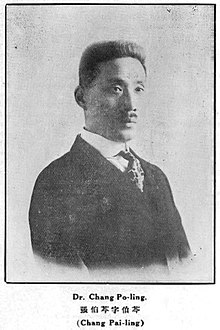Zhang Boling
| Zhang Boling 張伯苓 |
|
|---|---|
 |
|
| Born | 1876 Tianjin, Qing Dynasty |
| Died | 1951 Tianjin, People's Republic of China |
| Nationality |
|
| Alma mater | Saint John's University, Shanghai |
| Political party |
|
| Zhang Boling | |||||||||
| Traditional Chinese | 張伯苓 | ||||||||
|---|---|---|---|---|---|---|---|---|---|
| Simplified Chinese | 张伯苓 | ||||||||
|
|||||||||
| Transcriptions | |
|---|---|
| Standard Mandarin | |
| Hanyu Pinyin | Zhāng Bólíng |
| Wade–Giles | Chang Po-ling |
Zhang Boling (Chinese: 張伯苓; Wade–Giles: Chang Po-ling; April 5, 1876 – February 23, 1951) was a Chinese educator who founded Nankai University and the Nankai system of schools.
Zhang Boling was born in Tianjin in 1876 during the last years of the Qing Dynasty. His younger brother was P.C. Chang, a philosopher and diplomat. He was a cadet officer in the Beiyang Fleet, but he abandoned his training after the fleet was destroyed during the First Sino-Japanese War. He attended and graduated from Saint John's University in Shanghai.
After several years of teaching, Zhang Boling organized funding for a private college preparatory school, Nankai High School, in Tianjin in 1904. In 1917 he briefly studied at the Teachers College at Columbia University in the United States, where he was influenced by the American educator and reformer John Dewey. Afterwards, he expanded his school into a full university, Nankai University, in 1919. Under Zhang's leadership, Nankai continued to expand for the next few years and became one of the most prestigious universities in China.
He was noted for his emphasis on athletics, which he believed would rid China of its image as the 'Sick man of Asia' in the early 1900s, quoting that 'only a good sportsman can be a good teacher'. He established a number of annual national athletic meets and the forerunner to the modern Chinese Olympic Committee. He established several smaller institutions, including a girls middle school (1923), experimental primary school (1928), institute of economics (1927), and of chemistry (1932).
...
Wikipedia
